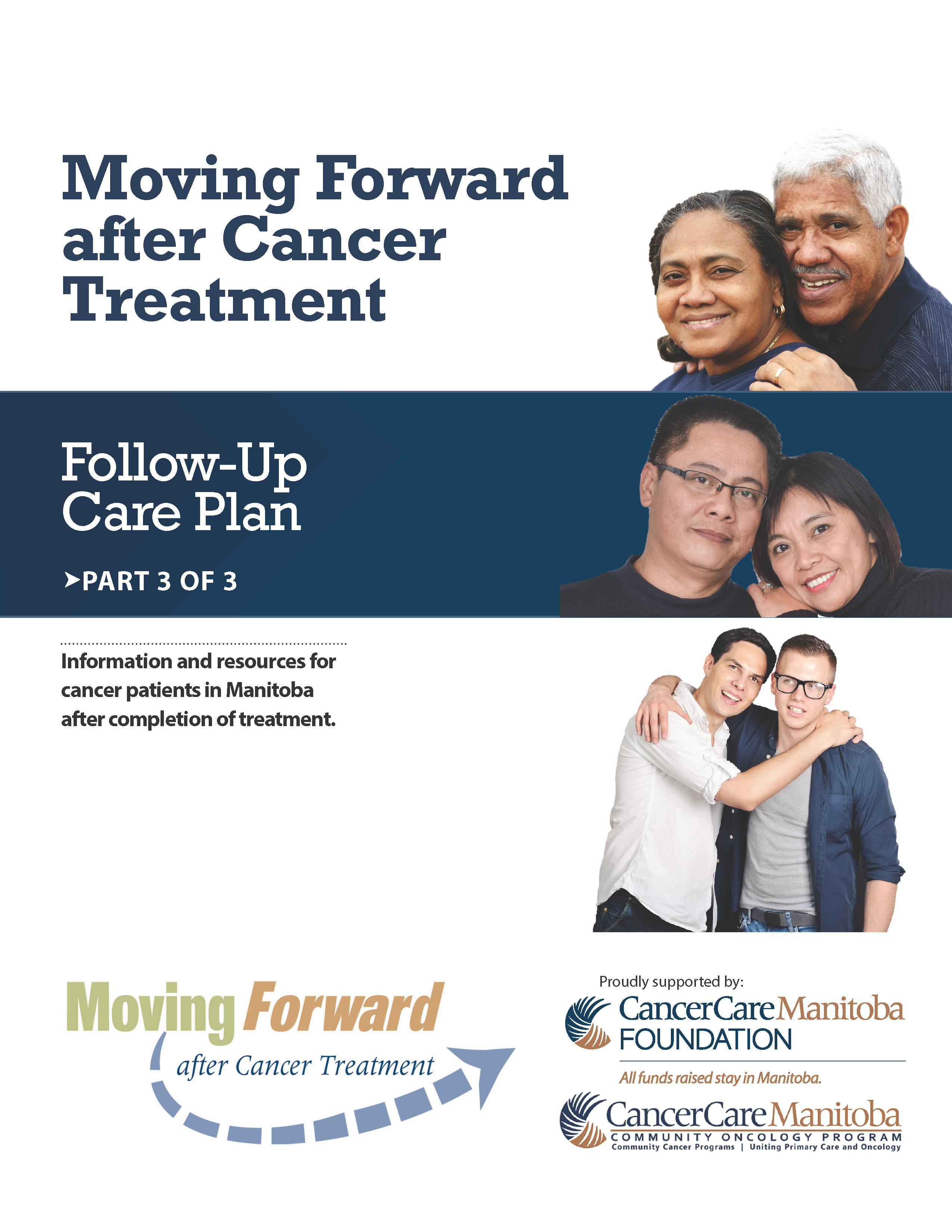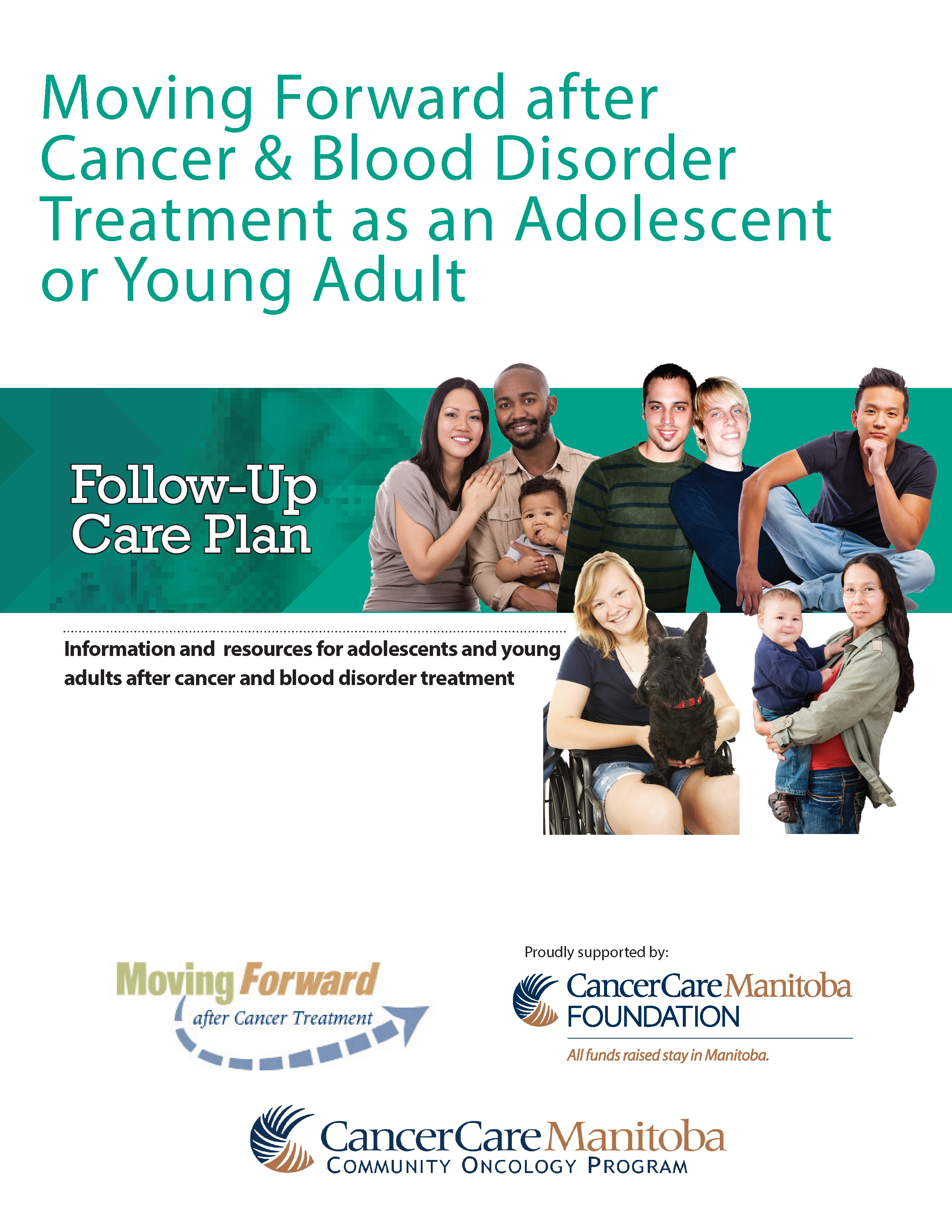Follow-up Care
Contact Us
Questions about this program or the developed care plans, please contact: transitions@cancercare.mb.ca.
Family physicians and nurse practitioners play a key role in caring for patients during and after their cancer treatment. CancerCare Manitoba has developed a Moving Forward after Cancer Treatment program, which helps patients and healthcare providers transition to follow-up care at the end of curative systemic/radiation therapy.
This program at CancerCare Manitoba is working to support follow up care and help patients and providers transition to follow up care at the end of curative systemic/radiation therapy by developing standardized care plans and implementing transition appointments.
General Follow-Up Care Resources
Follow Up Care Plan Part 3: Moving Forward After Cancer Treatment - This booklet is Part 3 (of 3) of the Follow Up Care plan package. It contains information on general wellness and health promotion, reducing future risk, and resources and supports available in Manitoba after being treated for any type of cancer.
This book is helpful for all cancer patients. It doesn't apply to a specific cancer type like the Part 2 book. This book contains information on:
- Feeling Well after Treatment
- Emotional Impact of Cancer and Treatment
- Primary Care, Medical Tests and Screening
- Reducing Risk of Recurrence
- Sleeping Well
- Home Cancer Drug Program
- Managing Skin Changes after Treatment
- Health Care Decisions and Considering the Future
- Additional Supports and Resources in Manitoba
Moving Forward After Cancer & Blood Disorder Treatment as an Adolescent or Young Adult
This booklet is supplemental to Parts 1-3 of the Follow Up Care plan package. It covers common questions and issues young people face after completing treatment as well as direct you to resources you can use.
This book contains information on:
- Isolation and Well Being
- Fertility
- Finances
- Education & Work
- Substance Use
- LGBT2SQ+
- Physical Activity and Nutrition
Cancer-specific Follow-up Care Recommendations
As part of its Moving Forward after Treatment program, CancerCare Manitoba provides physicians and nurse practitioners with recommended follow-up guidelines. Healthcare providers should view the summary and follow-up schedule form below related to their patient’s specific disease site.
While patients will receive a Moving Forward after Treatment booklet specific to the type of cancer they received treatment for, you may also provide them with an online link to a booklet below. Healthcare providers and/or their patients can complete the fill-in-the-blank diagnosis and treatment summary.
Follow-up Recommendations
Breast Cancer
- Breast Cancer Patients (not receiving hormonal therapy)
- Breast Cancer Patients on Aromatase Inhibitors (AIs)
- Breast Cancer Patients on Tamoxifen
- Breast Cancer Patients on Zoledronic Acid
- Breast Cancer Patient Follow-up Treatment Summary and Follow-Up Schedule Form
- Moving Forward after Breast Cancer booklet
What if a recurrence is suspected?
Cancer follow-up requires regularly scheduled office assessments and, for some cancers, blood and imaging tests. Early detection of recurrence has only been shown to reduce mortality in colorectal cancer, but psychologically it is important to patients and their providers to avoid delays. Remember that most recurrences are detected by patients themselves. It’s important to encourage our cancer patients to report new, persistent symptoms to us, and for us to ensure we have appointment systems that allow them to get in with minimal delay.
If recurrence is suspected, order the tests and imaging needed as per the guideline above and refer the patient back to CCMB using the CCMB Referral Form.



